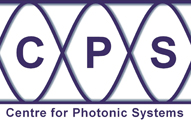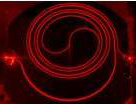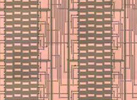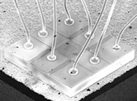| Centre for Photonic Systems Engineering Department Electrical Engineering Division |
 |
 |
 |
 |
 |
| Home | Research | People | Publications | Teaching | CDT | News | Contact |
|---|
|
CURRENT PROJECTS
PREVIOUS PROJECTS |

BASIC TECHNOLOGY: Nano- and Micro-scale Integration of Glass-on-Semiconductor for Photonic Components Engineering Objective: The proposed Basic Technology project aims to achieve a quantum leap in integration techniques for photonic devices by developing and using a range of micro- and nano-scale engineering tools for chemically dissimilar photonic materials; e.g. the glass-based materials with inorganic semiconductors. We anticipate that new tools will have a major impact on existing and emerging photonic components space used from ultra-violet to mid-IR. Potential applications, which we aim to demonstrate, are in signal processing for telecommunications, mid-IR sources and chemical and biological sensor technology, bio-photonics and imaging, space exploration and environment monitoring, data storage, security and military. The Basic Technology consortium comprises of 4 thematic areas / Materials Engineering and passive waveguide devices, Optoelectronic pump sources, Active Devices, and Applications. Complementary research for these 4 areas brings together a multi-disciplinary team encompassing Materials, Optics and Laser Physics, Optoelectronic and Photonic Devices, and the Medical Science and Chemicals Technology. Internationally well-known academic expertise from Leeds (IMR, IMP), Sheffield (EE), Cambridge (Photonic Systems), Heriot-Watt (Nonlinear Optics) and St.Andrews (Physics and Bute Medical School) Universities will demonstrate the key objectives, derived from the photonic integration of glass and inorganic semiconductor materials. The Basic Technology Programme is led by the University of Leeds and is supported by partners from industry, namely BP Chemicals, Renishaw, GlaxoSmithKline, QinetiQ, and NASA Langley (VA, USA). The proposed Basic Technology project aims to achieve a quantum leap in integration techniques for photonic devices by developing and using a range of micro- and nano-scale engineering tools for chemically dissimilar photonic materials; e.g. the glass-based materials with inorganic semiconductors. We anticipate that new tools will have a major impact on existing and emerging photonic components space used from ultra-violet to mid-IR. Potential applications, which we aim to demonstrate, are in signal processing for telecommunications, mid-IR sources and chemical and biological sensor technology, bio-photonics and imaging, space exploration and environment monitoring, data storage, security and military. The Basic Technology consortium comprises of 4 thematic areas / Materials Engineering and passive waveguide devices, Optoelectronic pump sources, Active Devices, and Applications. Complementary research for these 4 areas brings together a multi-disciplinary team encompassing Materials, Optics and Laser Physics, Optoelectronic and Photonic Devices, and the Medical Science and Chemicals Technology. Internationally well-known academic expertise from Leeds (IMR, IMP), Sheffield (EE), Cambridge (Photonic Systems), Heriot-Watt (Nonlinear Optics) and St.Andrews (Physics and Bute Medical School) Universities will demonstrate the key objectives, derived from the photonic integration of glass and inorganic semiconductor materials. The Basic Technology Programme is led by the University of Leeds and is supported by partners from industry, namely BP Chemicals, Renishaw, GlaxoSmithKline, QinetiQ, and NASA Langley (VA, USA). |
2020 Centre for Photonic Systems: information provided by webmaster@cps.cam.ac.uk |